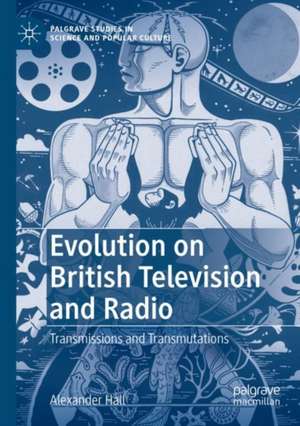Evolution on British Television and Radio: Transmissions and Transmutations: Palgrave Studies in Science and Popular Culture
Autor Alexander Hallen Limba Engleză Paperback – 2 oct 2022
| Toate formatele și edițiile | Preț | Express |
|---|---|---|
| Paperback (1) | 694.69 lei 43-57 zile | |
| Springer International Publishing – 2 oct 2022 | 694.69 lei 43-57 zile | |
| Hardback (1) | 700.10 lei 43-57 zile | |
| Springer International Publishing – oct 2021 | 700.10 lei 43-57 zile |
Preț: 694.69 lei
Preț vechi: 817.28 lei
-15% Nou
Puncte Express: 1042
Preț estimativ în valută:
132.93€ • 139.14$ • 110.64£
132.93€ • 139.14$ • 110.64£
Carte tipărită la comandă
Livrare economică 31 martie-14 aprilie
Preluare comenzi: 021 569.72.76
Specificații
ISBN-13: 9783030830458
ISBN-10: 3030830454
Pagini: 281
Ilustrații: XV, 281 p. 14 illus., 7 illus. in color.
Dimensiuni: 148 x 210 mm
Greutate: 0.36 kg
Ediția:1st ed. 2021
Editura: Springer International Publishing
Colecția Palgrave Macmillan
Seria Palgrave Studies in Science and Popular Culture
Locul publicării:Cham, Switzerland
ISBN-10: 3030830454
Pagini: 281
Ilustrații: XV, 281 p. 14 illus., 7 illus. in color.
Dimensiuni: 148 x 210 mm
Greutate: 0.36 kg
Ediția:1st ed. 2021
Editura: Springer International Publishing
Colecția Palgrave Macmillan
Seria Palgrave Studies in Science and Popular Culture
Locul publicării:Cham, Switzerland
Cuprins
1. Introduction: surveying the airwaves.- 2. Situating the Story: the early years of evolution on the wireless.- 3. Evolving the content for the small-screen, from radio to early television formats.- 4. Educating the Next Generation: schools and adult education.- 5. Settling into the Schedule: speaking about evolution across diverse genres.- 6. Humanist Blockbusters: the evolutionary epic on television.- 7. Reluctantly talking about Human Origins: Creationism in British broadcasting.- 8. Remembering or deifying? The Darwin anniversaries of 1959 and 2009.- 9. Conclusion.
Recenzii
“An important intervention that will help to advance our understanding of science broadcasting in Britain. … This quality … will attract scholars interested in science communication, the cultural history of evolution, and media history, to name just a few. … Overall, this is a fascinating cultural and intellectual history … of the twentieth century, one which will stimulate further research on the history of science communication and will be indispensable for undergraduate reading lists on the topic.” (Max Long,H-Net Reviews, h-net.org, April, 2022)
Notă biografică
Alexander Hall is a historian of science and Research Fellow in the Institute for STEMM in Society and Culture at the University of Birmingham, UK. His work examines the intersections between science and the media, exploring the narrative and visual forms of science communication to better understand sciences’ role in society.
Textul de pe ultima copertă
“With this historical account of the presentation of evolution on British television and radio, Alexander Hall adopts an astute angle to discuss the broader and more fundamental topic of the relationship between science and religion as it played out in 20th-century broadcast media. This is a well-researched study, revealing cultural trends and patterns which could easily go un-noticed, written well for specialists and non-specialists alike.”
- Jean-Baptiste Gouyon, author of BBC Wildlife Documentaries in the Age of Attenborough (Palgrave, 2019)
This book charts the history of how biological evolution has been depicted on British television and radio, from the first radio broadcast on evolution in 1925 through to the 150th anniversary of Charles Darwin’s Origin of the Species in 2009. Going beyond science documentaries, the chapters deal with a broad range of broadcasting content to explore evolutionary themes in radio dramas, educational content, and science fiction shows like Doctor Who. The book makes the case that the dominant use in science broadcasting of the ‘evolutionary epic’, a narrative based on a progressive vision of scientific endeavour, is part of the wider development of a standardised way of speaking about science in society during the 20th century. In covering the diverse range of approaches to depicting evolution used in British productions, the book demonstrates how their success had a global influence on the genres and formats of science broadcasting used today.Alexander Hall is a historian of science and Research Fellow in the Institute for STEMM in Society and Culture at the University of Birmingham, UK. His work examines the intersections between science and the media, exploring the narrative and visual forms of science communication to better understand sciences’ role in society.
Caracteristici
Analyses how evolutionary themes have been represented across all broadcasting genres in the UK across the 20th century Demonstrates how media producers play a crucial role in the translation and popularisation of scientific ideas Highlights how science communication often reflects wider societal narratives and worldviews











